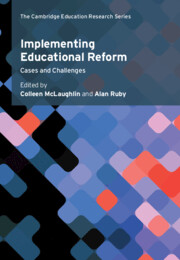Book contents
- Implementing Educational Reform
- Implementing Educational Reform
- Copyright page
- Contents
- Figures and Tables
- Contributors
- Preface
- 1 Why Focus on Implementation in Education Reform?
- 2 Promoting Equity in Education through System Change
- 3 A Decade of Reform in Hong Kong
- 4 Reforming a Whole School System
- 5 The Challenges and Opportunities of Greater Autonomy for Post-Soviet Universities
- 6 School Improvement by Design
- 7 Promising Practice in Government Schools in Vietnam
- 8 Reform Implementation Lessons
- 9 Qatar’s Road to Education Reform
- 10 Implementing Educational Reform
- Index
- References
4 - Reforming a Whole School System
The Case of Kazakhstan
Published online by Cambridge University Press: 19 November 2021
- Implementing Educational Reform
- Implementing Educational Reform
- Copyright page
- Contents
- Figures and Tables
- Contributors
- Preface
- 1 Why Focus on Implementation in Education Reform?
- 2 Promoting Equity in Education through System Change
- 3 A Decade of Reform in Hong Kong
- 4 Reforming a Whole School System
- 5 The Challenges and Opportunities of Greater Autonomy for Post-Soviet Universities
- 6 School Improvement by Design
- 7 Promising Practice in Government Schools in Vietnam
- 8 Reform Implementation Lessons
- 9 Qatar’s Road to Education Reform
- 10 Implementing Educational Reform
- Index
- References
Summary
In 2011, Kazakhstan began the wholesale reform of the educational system, that is, the curriculum, assessment, teacher development, language policy, funding mechanisms, leadership, teacher appraisal and teacher working conditions. Innovative methods of implementation were used including the use of new networks of schools. The authors were partners to the establishment of the schools of innovation (NIS), which were the experimental sites that served as models for the later translation to the whole school system that completed in 2020. Since 2016, the authors, with a team from Nazarbayev University, have systematically researched the attitudes and perceptions towards the implementation of the new curriculum so as to gain insight into the challenges on the ground and to learn about implementing such a radical transformation in mainstream schools. The case study explores the model of change, its implementation and the different perspectives of the teachers and school leaders, parents, local leaders of education, school students and the national stakeholders and policymakers.
- Type
- Chapter
- Information
- Implementing Educational ReformCases and Challenges, pp. 67 - 90Publisher: Cambridge University PressPrint publication year: 2021



